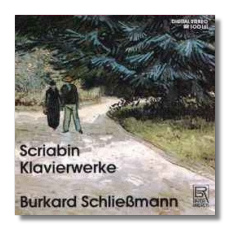
The Internet's Premier Classical Music Source
Related Links
- Scriabin Reviews
- Latest Reviews
- More Reviews
-
By Composer
-
Collections
DVD & Blu-ray
Books
Concert Reviews
Articles/Interviews
Software
Audio
Search Amazon
Recommended Links
Site News
 CD Review
CD Review
Alexander Scriabin

Piano Music
- Sonata #3, Op. 23
- Étude Op. 2 #1
- Étude Op. 8 #12
- Préludes, Op. 11 #1,3,9,10,13,14,16
- Préludes, Op. 16 #3, 4
- Préludes, Op. 27 #1, 2
- Prélude, Op. 37 #3
- Poéme Op. 44 #2
- Prélude Op. 51 #2
- Danse languide Op. 51 #4
- Sonata #9, Op. 68 (Black Mass)
- Vingt Préludes Op. 74 (five)
Burkard Schließmann, piano
Rudolf Bayer, Producer
Eberhard Schnellen, Engineer
Bayer Records BR100161 DDD 78:22
For me, Burkard Schließmann has come out of nowhere. The young German pianist has followed the usual currents of musical education: teachers (including Shura Cherkassky), festivals, and broadcasts. And despite this assembly-line inculcation he has arrived on the scene artistically intact. Perhaps he was able to avoid that most nefarious brainwasher of talent - the competition. Whatever his credentials, Schließmann rates an astounding musician, one who could approach the legends of Gieseking and Serkin if he can maintain this level of imagination. If HPR compiles a "Best of the Year", this will most likely be my entry.
Schließmann's playing is riveting. If I could actually see him in action, I would go one further and drop the concensus accolade for Sviatoslav Richter - mesmerizing, The Sonata #3, said by Scriabin to encompass the passionate throes of the creative soul, achieves these extremes in the hands of Schließmann: exultation, despair, furious denial. Schließmann has a bit of the mad poet in him. Whether you are familiar with the piece he is playing is immaterial - the first phrase "sets the hook" and he never lets you go. And perhaps he couldn't let you if he wanted; his concentration seems so involving that he may be forgetting to breathe for himself. The second movement of Op. 23 builds up like a rogue wave, cresting and crashing after sneaking up on you. Schließmann possesses split-second control of phrasing and coloration; just hear the transition between movements three and four of Op. 23, it goes from quiet resignation to utter terror. The effect is also Scriabin's genius. He pursues the development of his themes relentlessly, never breaking off the tension with the usual dramatic stop-gap of scales and arpeggios. All that concerns him is the immediate process of the musical idea, what he called the momentary "flux."
Beyond the presence and the inherent drama of the Schließmann approach, it is hard to single out any aspect of his playing as the lodestone of his appeal. With a pianist like Gould we an instantly focus on the unique secco touch and contrapuntal genius. Schließmann, despite the hot temperament evident here, gives the impression that his technique can stretch to fit anything his astonishing intellect can conceive, whereas a technical stuntman, say Gavrilov, is sometimes at a loss for meaningful employment of those skills. The divine synthesis Scriabin sought, the simultaneous coincidence of the individual conscience and the life of the world, is achieved here in great measure.
The Steinway captured here is especially colorful and vibrant. The liner notes are very good; the track information and organization are outstanding (if your player has indexing). If this release is intended as a Scriabin sampler, perhaps Bayer can persuade Schließmann to begin a survey of the complete works. But I would gladly hear anything he decides to record.
Copyright © 1997, Robert J. Sullivan
This review originally appeared in High Performance Review.


















